Introduction
Front
{{section_header}}{{section.name}}{{/section_header}}
Despite it's floral exterior, the {{product.name}} is a standard top-freezer refrigerator.
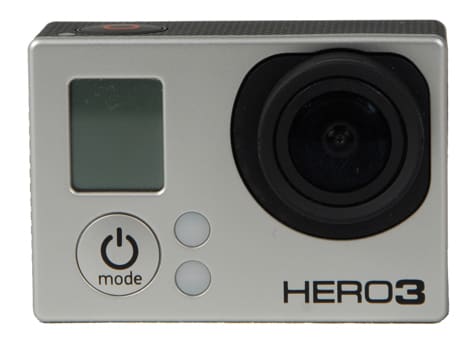
Fingerprints won't show up on the matte surface of this fridge.

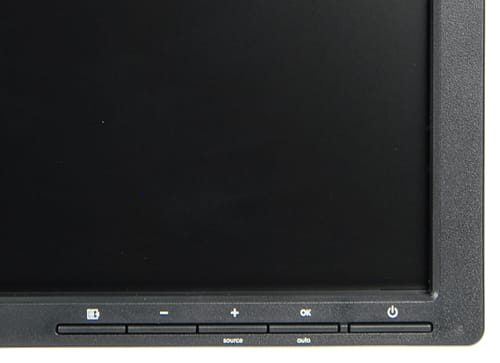
Interior
{{section_header}}{{section.name}}{{/section_header}}
The top third of the {{product.model}} is a freezer, while the bottom two thirds are the refrigerator.
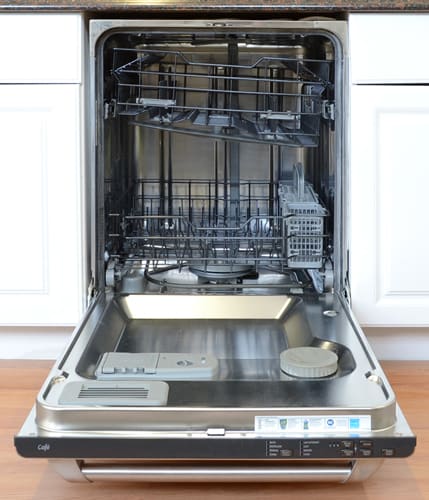
The interior of the CDWT980VSS.
In the main space, two full-size adjustable shelves span the width of the unit. The bottom shelf features a drawer that hangs below it and slides from left to right. At the bottom of the refrigerator, two crisper drawers are topped with one glass shelf. The drawers all slide without sticking, though they offer a glide that's far from smooth and the actual humidity control tab feels as if it could break off any minute.
Opening the refrigerator door reveals two full-size shelves, one half-size shelf and a dairy bin built into the door. None of these shelves can be repositioned. The entire bottom quarter of the fridge door is not usable space as it closes flush to the crisper drawers within the refrigerator.
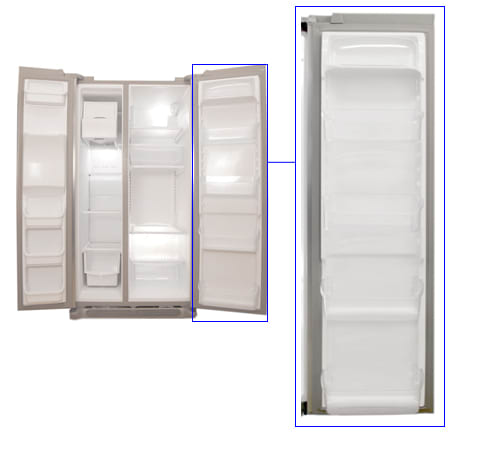
A wire shelf in the freezer's main space appears adjustable, though it can only sit in one spot if you're planning on using the ice maker.
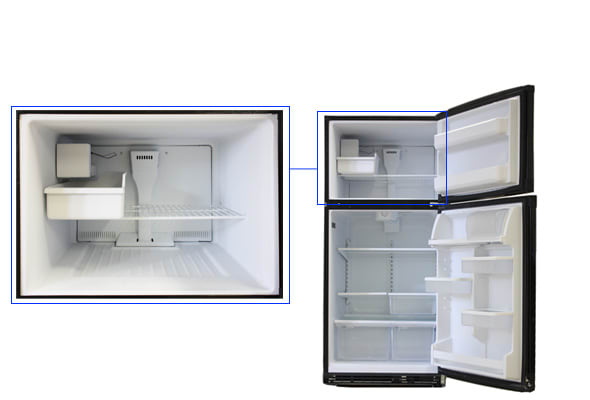
Two fixed plastic shelves sit in the freezer door.
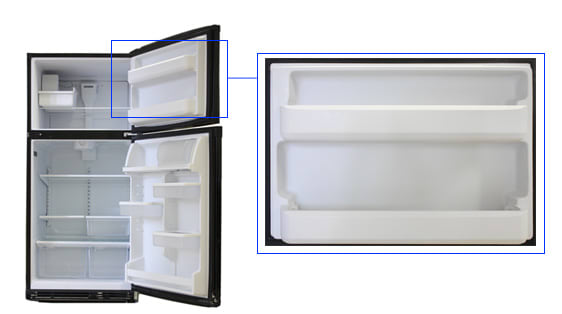
The ice maker and bin take up about a third of the freezer's top shelf.
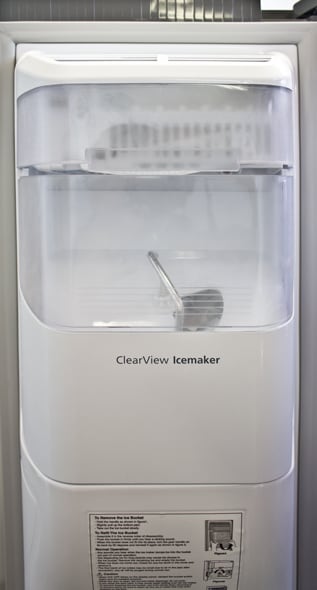
Back
{{section_header}}{{section.name}}{{/section_header}}
The back of the {{product.model}} features a water line and nothing else.
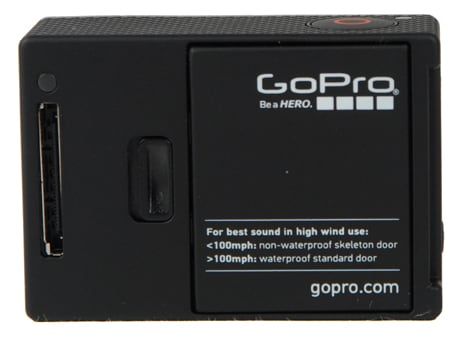
Sides
{{section_header}}{{section.name}}{{/section_header}}
The sides of the {{product.model}} are a stainless-style finish, and do not match the fridge's green fascia.
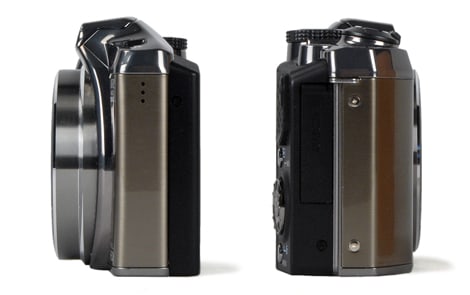
Olympus SZ-31MR iHS side views
Running Cost
{{section_header}}{{section.name}}{{/section_header}}
Thrifty folks will appreciate the {{product.name}}'s miserliness. Assuming that electricity costs 9.1 cents per kilowatt, running the {{product.name}} for a year should only cost you $29.90.
Power Use Per Cu Ft
{{section_header}}{{section.name}}{{/section_header}}
"Sure, the {{product.name}} doesn't use a lot of energy," you may scoff. "It's a small fridge!" Well, we've got a metric we use to compare very small fridges with very large fridges when it comes to energy efficiency, and the {{product.name}} still did very well. Measuring power use per cubic foot, the diminutive {{product.name}} used only 0.07 kWh per cubic foot in our testing.
Fridge Temperature
{{section_header}}{{section.name}}{{/section_header}}
If a fridge fails to keep the food inside the refrigerator compartment at a consistent, cold temperature, it's failed at its most basic function. We test the refrigerator's eponymous function by putting simulated food packages fitted with temperature sensors into the fridge compartment, recording the temperature over several days.
Ideally, a fridge temperature would always fall within the yellow zone on the above graph -- never too hot or too cold. As you can see, the {{product.name}} had some trouble at this task, with a few peaks and valleys. If food gets too cold or too warm, it may spoil sooner than if kept at a more constant temperature.
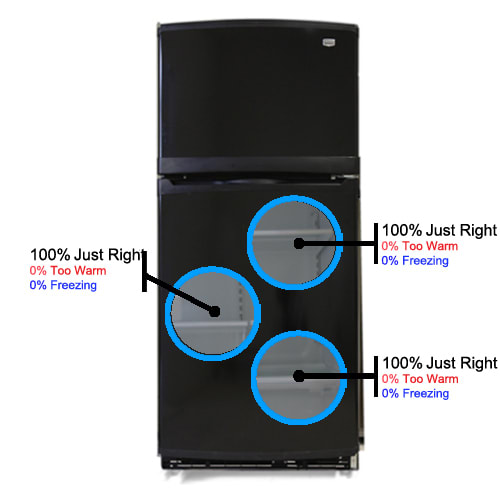
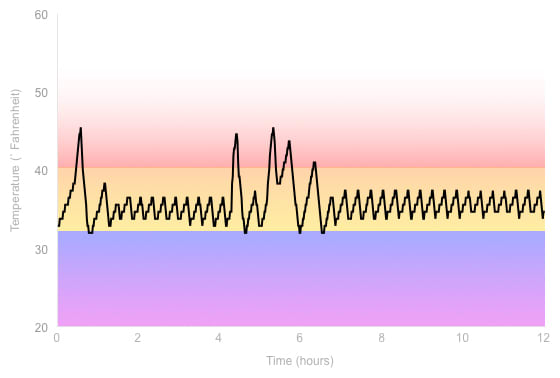
Freezer Temperature
{{section_header}}{{section.name}}{{/section_header}}
When a freezer constantly thaws and refreezes food, freezer burn and spoilage can occur. That's why we test the consistency of the temperature within freezer compartments. We do so by filling the freezer with simulated frozen food packages, some of which contain temperature sensors, and measuring the temperature over six days. This allows us to see whether the food itself remains a constant temperature, not just the air within the freezer.
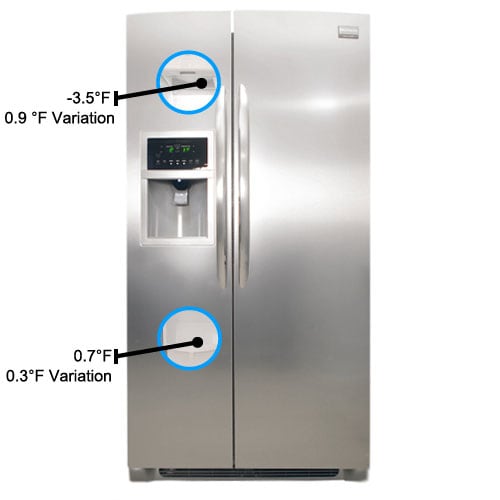
Ideally, a freezer will keep food within a tight temperature range. Straying too hot or cold will cause thawing or freezer burn. As you can see, the temperature of our test food packages stayed pretty constant within the {{product.name}}.
Vegetable Drawer
{{section_header}}{{section.name}}{{/section_header}}
Not only do fridges have to keep fresh food cold, but they also have to make sure it doesn't dry out. That task is left to the vegetable drawer, which isolates fruits, veggies and other fresh foods from the cold air blowing inside the fridge. We test the effectiveness of the vegetable drawer with a simulated veggie made of water-logged floral foam.
After four days inside the vegetable drawer of the {{product.name}}, our simulated vegetable had lost an average of 0.29 grams of water per hour. That's not an ideal score, and it means owners of the {{product.name}} better eat their grapes before they turn into raisins.
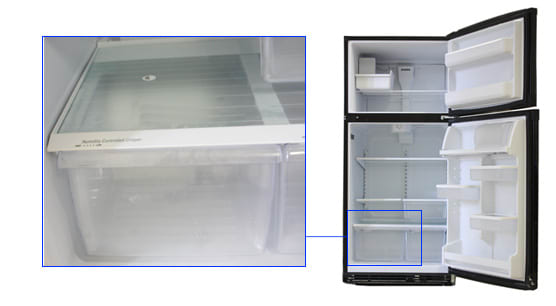
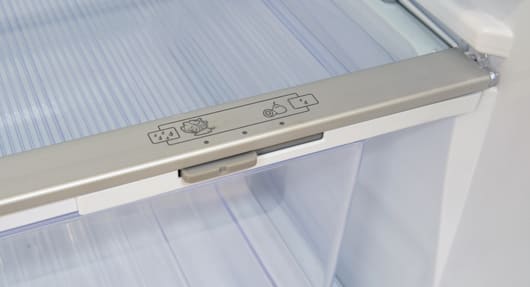
Power Loss
{{section_header}}{{section.name}}{{/section_header}}
To find out how long frozen food will keep during a power outage, and to some extent see how well the freezer compartment is insulated, we pull the plug on our fridge when all the simulated food packages are still inside and time how long it takes for the frozen food to thaw. While we'd never recommend eating food that's possibly spoiled, it's good to know that the {{product.name}} can keep frozen food frozen without any powered refrigeration for at least 36 hours.
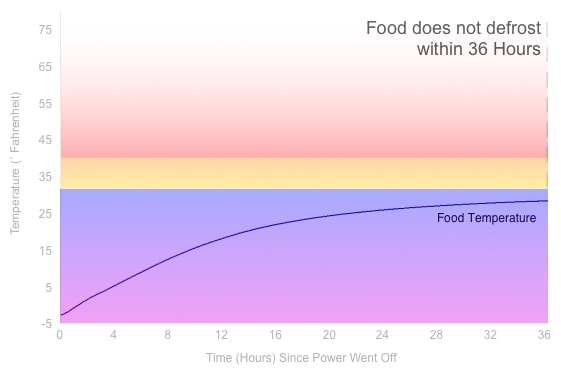
Freezing Performance
{{section_header}}{{section.name}}{{/section_header}}
The {{product.name}} freezes room temperature food in 2 hours, 11 minutes. We tested this by putting room-temperature simulated food packages with temperature sensors fitted to their centers in the freezer compartment and recording how long it took before the sensors read 32 degrees Fahrenheit.
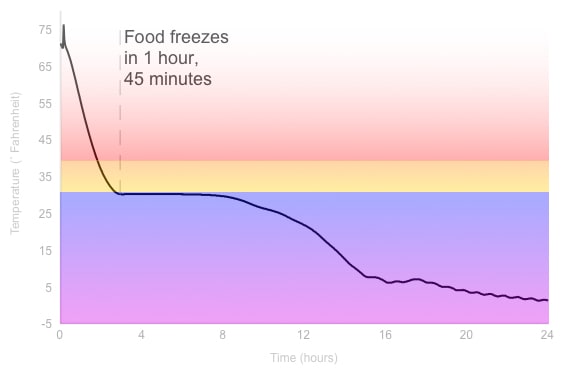
Usable Space
{{section_header}}{{section.name}}{{/section_header}}
Inside the fridge are two adjustable full-width shelves, one with a small drawer hanging beneath it. When closed, the drawer also slides from left to right to accommodate taller objects on the shelf beneath. A fixed shelf spans the space above the two crisper drawers.
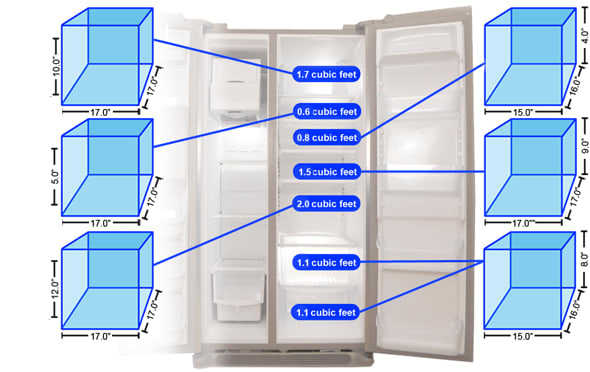
On the door, two fixed walled shelves sit beneath an opposable small dairy bin and tray. The bottom shelf is tall enough to fit a large soda bottle. To accommodate the fridge's crisper drawers, the door has no bottom shelf. If you're planning to store ten different kinds of barbecue sauce on the door, this fridge might be somewhat cramped.
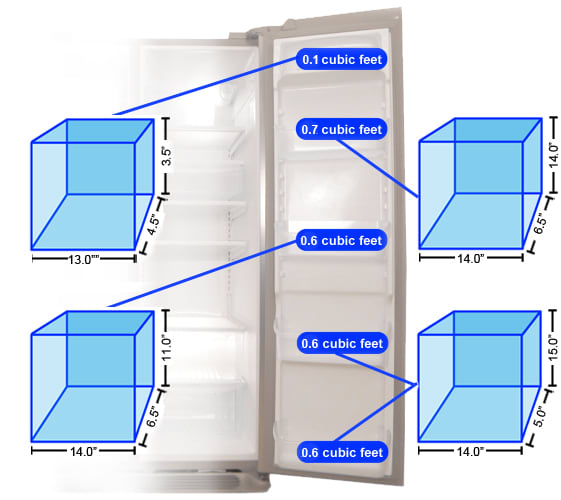
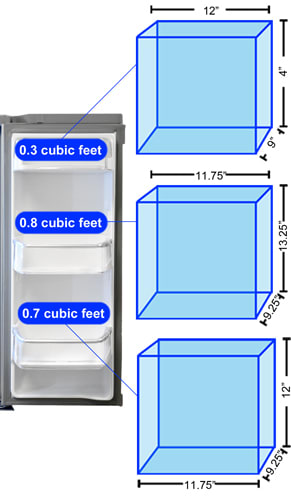
In the freezer, an adjustable shelf becomes fixed after installing the ice maker bin, which also takes up about a third of the top shelf. The bottom part is able to hold several frozen pizzas.
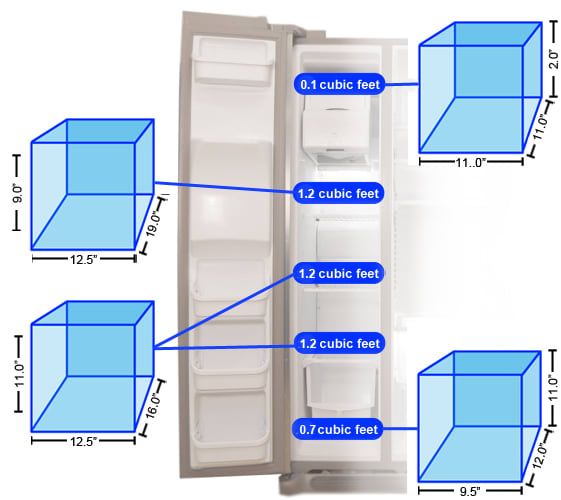
Fixed, walled shelves on the door can hold several boxes or bags of frozen food.
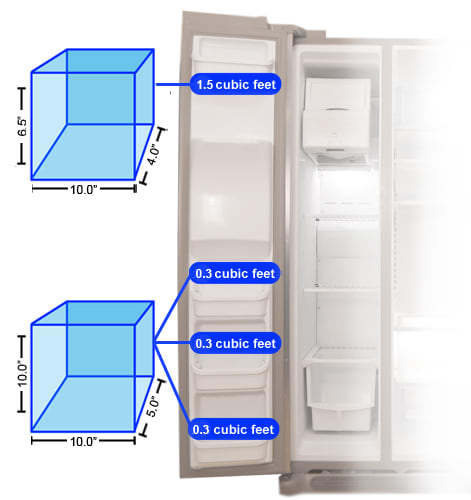
Below are the manufacturers own figures for capacity, and our own measurements for usable capacity. The manufacturers figures do not take account of the shelves, drawers and other removable features, but our measurements do account for the space these take up.
Ease of Access
{{section_header}}{{section.name}}{{/section_header}}
We didn't find any ease of access issues with the {{product.model}}. Doors were easy to open and could be mounted on either side. Shelves were easy to reposition.
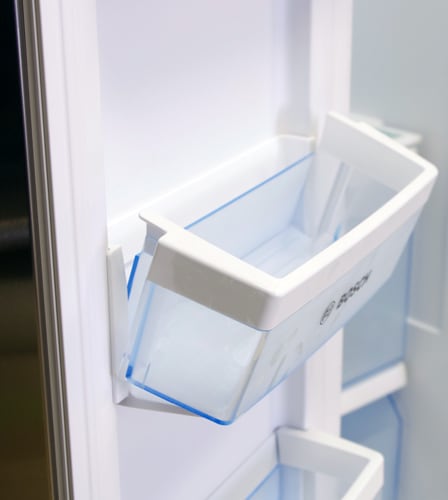
Controls
{{section_header}}{{section.name}}{{/section_header}}
That heading should read "Control," as there's only one on this fridge, controlling both the refrigerator and freezer. It offers a scale from 1 to 5 with no explanation of temperature other than 5 being the coldest.

Water Dispenser
{{section_header}}{{section.name}}{{/section_header}}
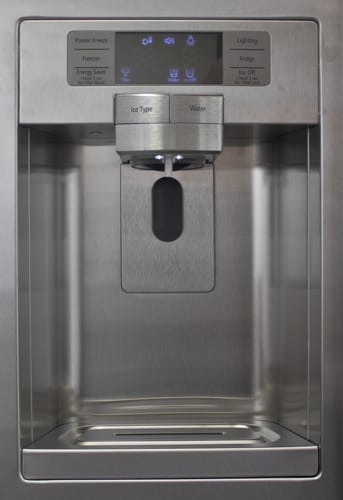
Ice Maker
{{section_header}}{{section.name}}{{/section_header}}
The ice maker and bin take up about a third of the freezer's top shelf.

Cleaning
Noise
Other Features
{{section_header}}{{section.name}}{{/section_header}}
{{product.manufacturer_specs['Other Features Photo BROKEN?']}}
Specs
{{section_header}}{{section.name}}{{/section_header}}
The Frigidaire FFHS2311LW can be found for about the same price as the {{product.name}}, but the two fridges are entirely different. Which one is right for you? If you're looking for storage space, get the Frigidaire.
Design
{{section_header}}{{section.name}}{{/section_header}}
If you think the Frigidaire is a boring old textured white fridge, and you can't stomach the thought of stainless, the {{product.name}} may be the fridge for you. If you're more concerned with interior space, an external icemaker and water dispenser and ease of access, get the Frigidaire.
Performance
{{section_header}}{{section.name}}{{/section_header}}
The {{product.name}} actually slightly outperforms the larger, fancier Frigidaire, offering more consistent temperatures and better freezer performance.
{{score_bars comp_num="1", scores="Power Use Rating, Running Cost Rating, Fridge Temperature Rating, Power Loss Rating, Freezer Temperature Rating, Freezing Test Rating"}}
Storage Space
{{section_header}}{{section.name}}{{/section_header}}
The {{product.name}} is a top-freezer, while the Frigidaire is a side-by-side. Obviously, the larger Frigidaire will hold more items, but the {{product.name}} can hold wider packages. If you're planning on stuffing your fridge with giant party trays, the {{product.name}} may be the better choice.
{{score_bars comp_num="1", scores="Freezer Usable Space Rating, Fridge Usable Space Rating"}}
Usability
{{section_header}}{{section.name}}{{/section_header}}
The Frigidaire has adjustable door shelves, which puts it ahead of the {{product.name}}. It's also easier to lose seldom-used items in the back of a top-freezer.
{{score_bars comp_num="1", scores="Usability Ease of Access Rating , Usability Controls Rating, Usability Water Rating, Usability Icemaker Rating, Usability Cleaning Rating"}}
Specs
{{section_header}}{{section.name}}{{/section_header}}
With more than four more cubic feet of overall interior space, the LG bests the diminutive {{product.name}}.
Design
{{section_header}}{{section.name}}{{/section_header}}
The LG offers a more traditional stainless design that will blend in with any kitchen, while the {{product.name}}'s unique exterior might not be everyone's cup of green tea. Inside, LG continues to impress with a more polished interior.
Performance
{{section_header}}{{section.name}}{{/section_header}}
The LG had a lot less temperature variance in the fridge, but both performed well in the freezer cavity.
{{score_bars comp_num="2", scores="Power Use Rating, Running Cost Rating, Fridge Temperature Rating, Power Loss Rating, Freezer Temperature Rating, Freezing Test Rating"}}
Storage Space
{{section_header}}{{section.name}}{{/section_header}}
With split shelves and a larger interior, the LG wins this comparison.
{{score_bars comp_num="2", scores="Freezer Usable Space Rating, Fridge Usable Space Rating"}}
Usability
{{section_header}}{{section.name}}{{/section_header}}
The {{product.name}}'s shelves are easy to adjust, but they're not split. Hence, the edge goes to the LG.
{{score_bars comp_num="2", scores="Usability Ease of Access Rating , Usability Controls Rating, Usability Water Rating, Usability Icemaker Rating, Usability Cleaning Rating"}}
Specs
{{section_header}}{{section.name}}{{/section_header}}
The A9RXNMFWS is the {{product.name}}'s larger sibling. As such, it's got more interior space.
Design
{{section_header}}{{section.name}}{{/section_header}}
The {{product.name}} is the riskier choice as far as style is concerned. Inside, the fridges are similar, though the larger Amana is a lot more customizable.
Performance
{{section_header}}{{section.name}}{{/section_header}}
Both fridges perform about the same when it comes to temperature consistency in the freezer and freezing tests, though the {{product.name}} doesn't do as well on humidity testing or in fridge temperature consistency.
{{score_bars comp_num="3", scores="Power Use Rating, Running Cost Rating, Fridge Temperature Rating, Power Loss Rating, Freezer Temperature Rating, Freezing Test Rating"}}
Storage Space
{{section_header}}{{section.name}}{{/section_header}}
Obviously, the bigger fridge has more space.
{{score_bars comp_num="3", scores="Freezer Usable Space Rating, Fridge Usable Space Rating"}}
Usability
{{section_header}}{{section.name}}{{/section_header}}
With split shelves and moveable fridge door shelves, the A9RXNMFWS is better in usability tests.
{{score_bars comp_num="3", scores="Usability Ease of Access Rating , Usability Controls Rating, Usability Water Rating, Usability Icemaker Rating, Usability Cleaning Rating"}}
Conclusion
Energy Efficiency
The {{product.name}} has excellent energy efficiency, with one of the lowest electricity costs per cubic foot of interior space we've ever seen.
Performance
The {{product.name}} is good at keeping food cold and at a consistent temperature, but its vegetable drawers are lousy at keeping fresh foods from drying out.
Storage Space
For a small fridge, the {{product.name}} has enough space. Still, the lack of a shelf at the bottom of the fridge door eats up a lot of valuable real estate.
Usability
Shelves are in theory spill-proof, though water easily pours over the sides. They're easy to adjust, but can't fit in too many configurations. You'll probably have to put all your tall items on one shelf. Fixed shelves on the door cut into usable space.
Meet the tester
Keith was the Editor in Chief of Reviewed's appliance and automotive sites. His work has appeared in publications such as Wired, Car & Driver, and CityLab.
Checking our work.
Our team is here to help you buy the best stuff and love what you own. Our writers, editors, and experts obsess over the products we cover to make sure you're confident and satisfied. Have a different opinion about something we recommend? Email us and we'll compare notes.
Shoot us an email